
7 minute read
Maggie Valley 50 | Maggie Valley
At Maggie Valley, years are ordered in accordance with the strawberry
Story by Jacquelyn Hall Photos by David Moore
Advertisement
One might think winter is the time that farmers get some much deserved rest. One would, however, be wrong in that assumption. While it is their least busy season, it is by no means a vacation.
David and Margaret Cox of Maggie Valley Berry Patch and Gardens in Grant are busy nearly every day preparing for spring. From getting their supplies in order, to checking inventory and equipment, there always seems to be something to do.
Due to the pandemic, their plants for this year were late in arriving, as availability and shipping were affected by the limitations that Covid-19 has imposed upon the world. The plants did not go into the fields until October.
In November, when they start to see the true cold settle in, the Coxes place plasticlooking fabric sheet covers over the newly planted strawberries. The covers not only protect the plants from the frost, but trap the warmth from the soil, creating a sort of greenhouse for the plants.
From late December to January, depending upon weather and plant needs, they remove the frost covers that also ensure the strawberries do not bloom prematurely.
This year they should have their greatest variety of strawberries ever. That’s also due to the impact of Covid-19, particularly in Canada, which is where the starter plants originate. Normally the Coxes plant three or four varieties, but in order to meet the number of plants they need, this year they expanded to eight varieties.
David and Margaret – Maggie to most people – have an ingenious way of fertilizing and irrigating their plants. From their two ponds they pump water to designated spigots. At the pump, they can add the fertilizer which is custom mixed per each field’s needs.
Their method is not only cost efficient, but incredibly effective. David calls it “fertigating” combining fertilize and irrigate, an apt name if there ever was one.
Going into their 11th year of farming, Margaret reflects on their beginnings as “a hobby that grew out of hand.”
Margaret is tied to the land through

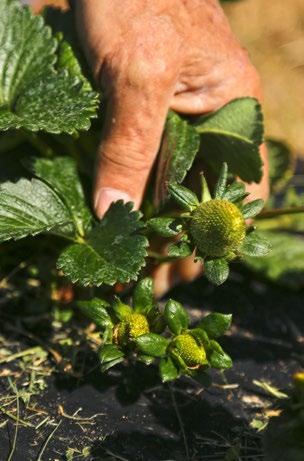
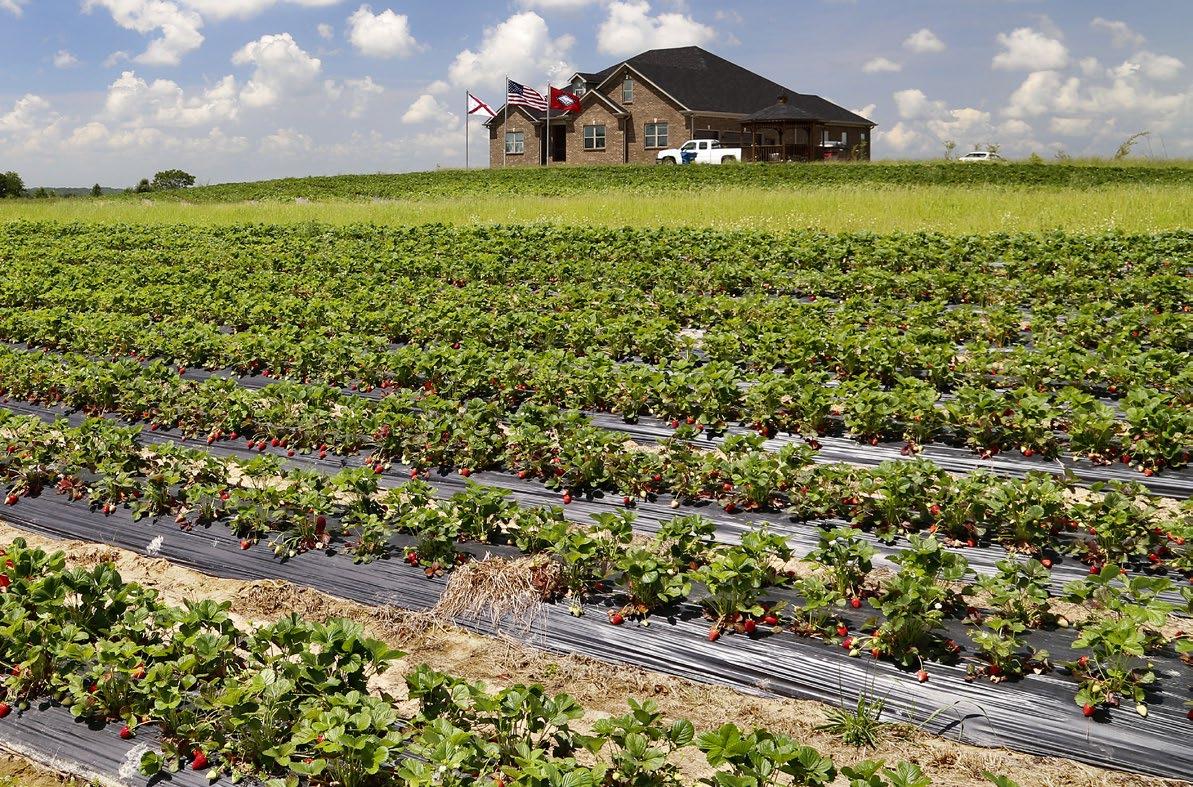
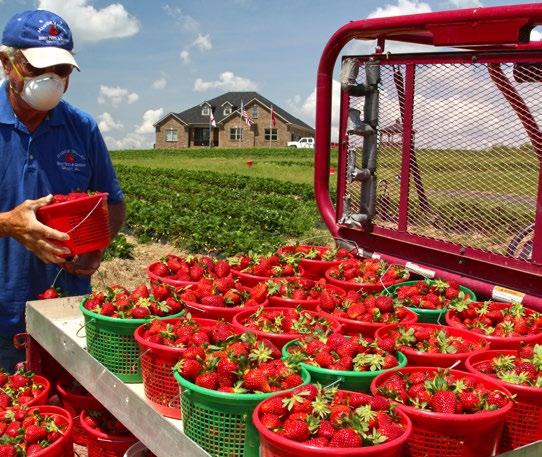
Along with US and Alabama flags, David and Margaret “Maggie” Cox fly the flag of their home state of Arkansas in front of the house they built and occupied in 2019. Margaret handles much of the business end while David, left, who’s retired from USDA, heads up the farming. They hire about a half-dozen people who help, including someone to weed-eat rows as the plants bloom in early April. By mid-May, a team of women, above, are helping him pick. Besides strawberries, the Coxes also sell sauces and jellies produced off-site. Once this year’s crop begins to ripen, probably mid-April, they’ll be open 8 am-5 pm Monday-Saturday and Sunday afternoons.
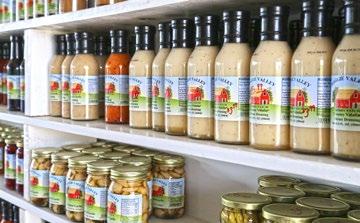
multiple generations. She moved from Grant to Arkansas when she married David in 2000. After he retired from the United States Department of Agriculture, they moved back here in 2002, bought some of her family land and began to garden. Starting with a typical summer garden with vegetables and a few berries, they sold their produce at farmers markets.
Slowly expanding from their backyard garden they planted blueberry bushes, hybrid blackberry bushes and a half-acre of strawberries, which amounted to 7,000 plants.
David’s cousin in Arkansas also had a successful strawberry farm. He helped the Coxes get started by offering advice gained through his experience. He was eventually

Social distancing did little to thwart business last season. One Saturday found vehicles parked on both sides of the road and a line of customers. Even though they were spread out, the line still stretched down the road to the Coxes’ driveway. Several times last year, Linda Smith, above right, made 75-mile round trips from Pisgah to Maggie Valley, located atop Gunter Mountain near Grant. “I make these trips for the community,” she says, paying Margaret “Maggie” Cox at the checkout counter for 15 gallons of the delectable red berries. “It’s worth it.” Linda says the first time she visited she figured the Coxes bought berries from Maggie Valley, a North Carolina town by the Great Smoky Mountains National Park. “We’re all amazed that this Maggie Valley is actually on a mountain,” she laughs. “We hear that all the time,” says Margaret “Maggie” Cox. The backstory dates to 2002 when the Coxes moved to her former house in Grant. Their neighbor, Ricky Sutphin, who lived across the road from them and their sloping, manicured garden always said “he loved looking into Maggie’s Valley.” It stuck.
able to visit and see the whole operation before he passed away a few years ago.
Now with five acres, all purchased over time “in bits,” David and Margaret mainly focus on strawberries. They planted over 84,000 plants for this year.
Anon-profit farming organization that they were in contact with through the Marshall County Extension Office helped them get started. It was encouragement and support they have not forgotten, as they pay it forward to other start-up raisers by advising and helping the new farmers connect with all the resources available.
In the process of learning the ropes of farming, they have attended and hosted workshops for food and agricultural safety, the Alabama Cooperative Extension Service and Master Gardener training. In these classes and workshops, they have learned how to utilize the best practices for their farm.
And what the Coxes have created has become a natural gathering place for the community. Margaret says their goal was to make it “not just a place to buy a bucket of strawberries, it’s a place to experience.”
They have succeeded. The World War II-era barn they restored is a community landmark and reminder of Margaret’s family. (See page 8.) They built an openair building for handling and selling strawberries and other produce and sometimes host meetings and other events.
With love and support from the Grant area, Maggie Valley has become a community center, a place where family and friends come together just to “gab like the old days.”
With the community at heart, the Coxes support the local Greg Fuell Memorial and Daniel Helton Memorial scholarships. When Covid precautions allow, they plan to host a large fundraiser for both.
Maggie Valley has been featured in several other publications and in 2009 was presented a national conservation award from the Daughters of the American Revolution, further marking their respect in the community they love and serve.
Spring, as one would expect, is one of the busiest seasons. Around early to midApril, the strawberries are ripe and ready to be picked and sold. While they no longer have pick-your-own strawberries, they do have “u-pick” blueberries in June. In
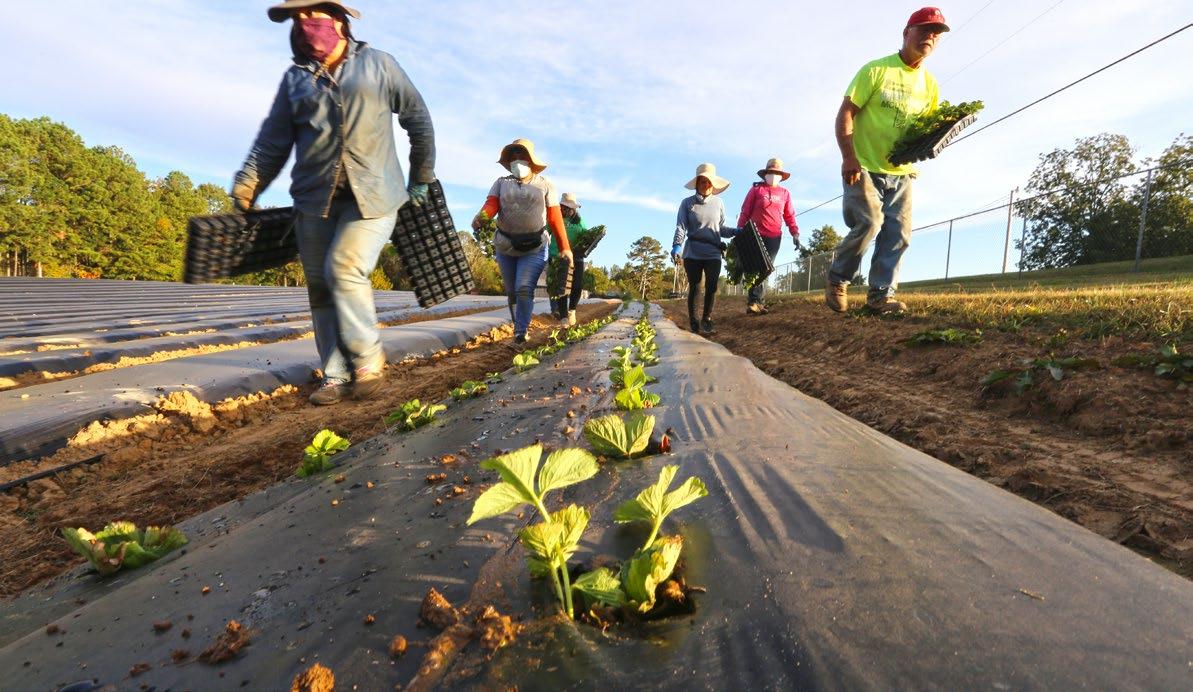
Behind schedule last year because of Covid-delayed delivery of young plants, David and the picking crew were busy in late October 2020 getting the crop for 2021 in the ground. David uses a tractor attachment with two rotating wheels that not only puncture the plastic row covering with properly spaced holes, but waters the holes, too. The planters, and David when he parks his tractor, then go along and gently cover the roots of the baby plants.

addition to Maggie Valley, they sometimes sell in Guntersville, Owens Cross Roads and Scottsboro.
In addition to the strawberries, in the spring and summer one can enjoy ice cream under a covered patio at tables where you can gather and take in the company, the view, food, and look around their shop.
They carry an assortment of jams, jellies, sauces and salsas under the Maggie Valley brand that are produced for them elsewhere.
Preparation for the next spring 2022 will begin in August when they begin pulling out the old plants, soil testing, fertilizing and tilling the soil.
They hope to plant baby strawberries for next season in early September. They monitor these young plants for illness and pests such as the spider mites that typically pose a threat to the health of the plants.
The rest of the autumn sees David and Margaret maintaining equipment and tidying up things in preparation for the coming year.
In the fall, they are also busy harvesting pecans from trees long grown on family land. The pecan crop of 2020 was their most prolific to date. It packed their enormous chest freezer to the top.
It’s year-round work for the Coxes, ordered in accordance with strawberries, and it’s turned Maggie Valley into a hidden gem in Marshall County.
The short drive there essentially transports the visitor back in time to a place with the nostalgic feel of the old “small town” way of life.
Oh, and the strawberries are delicious.










